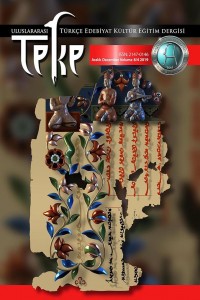Öz
In this study, it is aimed
to determine teachers‘ views of classroom management in theory and practice to
help the development and implementation of new strategies to improve classroom
management skills and to increase the quality of preschool education. The study
sample consisted of 20 preschool teachers (19 women; 1 men) who have been
working in public and private kindergartens within the central district of Muş
in Turkey for 1 to 17 years. According to results, participants’ self-assessments
of using reward and punishment strategies in classroom management show that
Teacher Determination is the most important factor in the structuring,
determination and implementation of all other strategies used in classroom
management. It is recommended that new approaches be developed in classroom
management based on digitalization and Education 4.0. Teachers should be
trained on different management strategies such as robot teachers, gamification
and inverted classes.
Anahtar Kelimeler
Preschool teachers classroom management phenomenological research qualitative research teachers‘ views
Kaynakça
- Akgün, E., Yarar, M., & Dinçer, Ç. (2011). The evaluation of classroom management strategies of preschool teachers in classroom activities. Pegem Eğitim ve Öğretim Dergisi, 1(3), 1-9.
- Aydın, A. (2010). Examinings about pre-primary cirruculum of pre-primary school's teachers Unpublished Master Thesis, Kars, Turkey: Kafkas University Social Sciences Institute.
- Başar, H. (2009). Sınıf yönetimi. Ankara: Pegem Akademi.
- Bilmes, J. (2004). Beyond behavior management: The six life skills children need to thrive in today’s World. Redleaf Press.
- Blazar, D., & Kraft, M. A. (2017). Teacher and teaching effects on students’ attitudes and behaviors. Educational Evaluation and Policy Analysis, 39(1), 146-170.
- Bolat, Ö. (2016). Beni ödülle cezalandırma. İstanbul: Doğan Kitap.
- Celep, C. (2009). Sınıf yönetiminde kuram ve uygulama. (5. Baskı). Ankara: Pegem Akademi.
- Çelik-Akkaya, N (2006). Determining the perception of classroom management skills for primary school class teachers’. Unpublished Master Thesis, Eskişehir: Anadolu University Institute of Educational Sciences.
- Çubukçu, Z., & Girmen, P. (2008). Teachers’ opinions on their classroom management skills. Bilig/Türk Dünyası Sosyal Bilimler Dergisi, 44, 123-142.
- Durğun, B. (2010). Depending on various variables, examining classroom management skills of teachers who have students that need special training (an example of Sancaktepe district). Unpublished Master Thesis, İstanbul: Yeditepe University Institute of Social Sciences.
- Egeberg, H. M., McConney, A., & Price, A. (2016). Classroom management and national professional standards for teachers: A review of the literature on theory and practice. Australian Journal of Teacher Education, 41(7), 1-18.
- Ekici, F., Günhan, G. & Anılan, Ş. (2017). Preschool teachers’ clasroom manangement skills. Uluslararası Bilimsel Araştırmalar Dergisi, 2(1), 48-58.
- Gehlbach, H., Brinkworth, M. E., & Harris, A. D. (2012). Changes in teacher–student relationships. British Journal of Educational Psychology, 82(4), 690-704.
- Güven-Denizel, E., & Cevher, N. (2005). The level of preschool teachers’ classroom management skills and its relations with different variables. Pamukkale Üniversitesi Eğitim Fakültesi Dergisi, 18(18), 71-92.
- Hamre, B. K., Pianta, R. C., Burchinal, M., Field, S., LoCasale-Crouch, J., Downer, J. T. & Scott-Little, C. (2012). A course on effective teacher-child interactions: Effects on teacher beliefs, knowledge, and observed practice. American Educational Research Journal, 49(1), 88- 123.
- Hu, B. Y., Fan, X., Wu, Z., LoCasale-Crouch, J., Yang, N., & Zhang, J. (2017). Teacher-child interactions and children's cognitive and social skills in Chinese preschool classrooms. Children and Youth Services Review, 79, 78-86.
- Karademir, A. (2013). The reflection of school climate on the learning and teaching process from the perspective of public preschool administrators and teachers. Unpublished Master Thesis, Eskişehir: Anadolu University Institute of Educational Sciences.
- Kohn, A. (2006). Beyond discipline: From compliance to community. ASCD. Lippard, C. N., La Paro, K. M., Rouse, H. L., & Crosby, D. A. (2018, February). A closer look at teacher–child relationships and classroom emotional context in preschool. In Child & Youth Care Forum, 47(1), 1-21. Springer US.
- Kozikoğlu, İ. (2018). Okul öncesi öğretmenlerinin değerler eğitimine ilişkin tutum ve görüşlerinin incelenmesi. Uluslararası Türkçe Edebiyat Kültür Eğitim Dergisi, 7(4), 2698-2720.
- Llewellyn, L. L., Boon, H. J., & Lewthwaite, B. E. (2018). Effective behaviour management strategies for australian aboriginal and torres strait islander students: a literature review. Australian Journal of Teacher Education, 43(1). Retrieved from http://ro.ecu.edu.au/ajte/vol43/iss1/1
- Luebbering B. (2010). Classroom management. In: Clauss-Ehlers C.S. (eds) Encyclopedia of cross-cultural school psychology.
- Öztürk, Y. & Gangal, M. (2016). Preschool teachers’ beliefs about discipline, classroom management, and disruptive behaviors. Hacettepe Üniversitesi Eğitim Fakültesi Dergisi, 31(3), 593-608.
- Sadık, F. (2008). Sınıf yönetiminde temel kavramlar ve yaklaşımlar. In Y. Aktaş Arnas and F.Sadık (Ed.), Okul öncesi eğitimde sınıf yönetimi (pp.13-60). Ankara: Kök Yayıncılık.
- Springer, Boston, MA. O'Rourke, M. & Harrison, C. (2004). The introduction of new technologies: new possibilities for early childhood pedagogy. Australian Journal of Early Childhood, 29(2), 11-18. Retrieved February 5, 2019 from https://www.learntechlib.org/p/104634/
- Şahin, Ç., Kartal, O. Y., & İmamoğlu, A. (2013). The opinions of pre-school teacher candidates about pre-school teacher education program. Ahi Evran Üniversitesi Kırşehir Eğitim Fakültesi Dergisi (KEFAD), 14 (1), 101-118.
- Şıvgın, N. (2005). Teachers perspectives about the early childhood education program: Denizli case. Unpublished Master Thesis, Denizli: Pamukkale University Institute of Social Sciences.
- Terzi, A. R. (2002). Sınıf yönetimi açısından etkili öğretmen davranışları. Millî Eğitim Dergisi, 155, 162-169.
- Trawick-Smith, J., Swaminathan, S., & Liu, X. (2016). The relationship of teacher–child play interactions to mathematics learning in preschool. Early Child Development and Care, 186(5), 716-733.
- Uyanık-Balat, G. (2010). Sınıf yönetimi kavramı ve sınıf yönetimi modelleri. In G. Uyanık Balat ve H. Bilgin (Ed.), Okul öncesi eğitimde sınıf yönetimi. Ankara: Eğiten Kitap. Yaşar-
- Zembat, R., Koçyiğit, S., Akşin-Yavuz, E. & Tunçeli, H. İ. (2018). Çocukların benlik algısı, mizaç ve sosyal becerileri arasındaki ilişkiler. Uluslararası Türkçe Edebiyat Kültür Eğitim Dergisi, 7(1), 548-567.
Ayrıntılar
| Birincil Dil | İngilizce |
|---|---|
| Bölüm | Makaleler |
| Yazarlar | |
| Yayımlanma Tarihi | 15 Aralık 2019 |
| Gönderilme Tarihi | 20 Mart 2019 |
| Yayımlandığı Sayı | Yıl 2019 Cilt: 8 Sayı: 4 |


